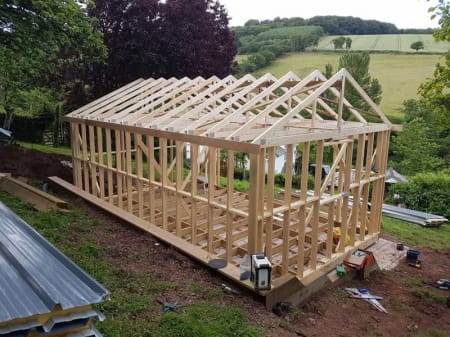Garden Room Timber Frame Construction
Traditional timber frame construction is a building method that has been used for centuries, with roots dating back to ancient civilizations.
It is a method of constructing a building using a frame of timber, rather than using concrete or steel as the primary structural material.
Timber frame construction has a number of benefits, including its sustainability, durability, and aesthetic appeal.
The origins of timber frame construction can be traced back to ancient civilizations, such as the Romans and Greeks, who used timber to construct buildings and other structures. In Europe, construction using timber frames became popular during the Middle Ages, with many churches, castles, and other buildings being constructed using this method. In the United States, timber frame building construction was also popular during the early colonial period, with many of the earliest settlers using this method to build their homes and other structures.
One of the main benefits of timber frame construction is its sustainability. Timber is a natural resource that can be harvested and replanted, making it a renewable building material. Timber frame construction also has a smaller carbon footprint compared to other building methods, as the production of steel and concrete involves the release of large amounts of carbon dioxide.
Timber construction is also highly durable. Timber is a strong and sturdy material, and when used in construction, it is able to withstand the wear and tear of daily use. Timber frame buildings can last for hundreds of years with proper maintenance, making them a long-lasting and cost-effective option.
In addition to its sustainability and durability, timber frame construction is also known for its aesthetic appeal. Timber has a natural beauty that can enhance the appearance of a building, and it can be finished in a variety of ways to suit the desired style. Construction using traditional timber frame methods can also be used to create unique and complex architectural designs, making it a versatile building method.
There are several different types of timber frame construction, including post and beam, balloon frame, and platform frame. Post and beam construction involves the use of vertical posts and horizontal beams to create the frame of the building. Balloon frame construction involves the use of continuous studs that run from the foundation to the roof, with the spaces between the studs being filled in with insulation and other materials. Platform frame construction involves the use of a series of horizontal platforms, with each floor being built on top of the previous one.
Timber frame construction has a number of uses, including residential, commercial, and agricultural buildings. It is often used for homes, as it allows for the creation of open and spacious living areas. Timber frame construction is also commonly used for commercial buildings, such as garden rooms, office buildings, retail stores, and restaurants. In the agricultural sector, a timber frame method is often used for barns and other farm buildings.
There are also a number of benefits to using timber frame construction in residential buildings. Timber frame homes are often more energy efficient than traditional homes, as the insulation in the walls and roof can help to keep the home warm in the winter and cool in the summer. Timber frame homes are also often faster to construct, as the frame can be assembled offsite and then erected on the building site.
In conclusion, traditional timber frame construction is a building method with a long history and a number of benefits. It is sustainable, durable, and aesthetically pleasing, and it can be used for a variety of purposes. Whether for residential, commercial, or agricultural buildings, timber frame construction is a viable and attractive option for anyone looking to build a new structure.
